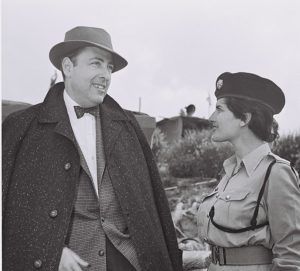By Moshe Phillips

Herman Wouk, the famed novelist who became a household name subsequent to his 1951 Pulitzer Prize winning novel The Caine Mutiny died last week nearly 70 years after achieving international fame. Besides his long career as a writer he was also a lifelong Zionist.
One would be hard pressed to find references to his love for the State of Israel in the numerous articles celebrating his literary career and marking his deathshortly before his 104th birthday. I hope to rectify that omission.
Time and again, Wouk focused much of his literary efforts on Israel: Two of his non-fiction works – This is My God: The Jewish Way of Life (1959), and The Will to Live On: This is Our Heritage (2000), as well as The Hope (1993) and The Glory (1994) center on Judaism and the State of Israel, and what they meant to him personally.
Perhaps no line that he wrote demonstrates his profound love for Israel more than this one from This is My God: “The first time I saw the lights of the (Israeli) airport in the dusk from the descending plane, I experienced a sense of awe that I do not expect to know again in this life.” Wouk, an Orthodox Jew, synthesized his love of Torah with his love of the reborn Jewish state.
For Wouk, Zionism – the ideology underlying and enabling the rebirth of the State – takes on heroic proportions. In This is My God, he writes, “Zionism is a single long action of lifesaving, of snatching great masses of people out of the path of sure extinction.”
His love and admiration for Israel never diminished: About forty years later, in The Will to Live On, written forty years after This is My God, he inter-weaves Jewish history with his personal interactions with David Ben-Gurion, Yitzhak Rabin, and other leading Israeli generals and politicians. Indeed, one of his major heroines, Natalie Jastrow, undergoes a long and tortured personal journey from typical American Jewish teenager to Holocaust victim to Zionist. As a U.S. Naval officer during World War II, Wouk’s respect for the IDF’s accomplishments encompasses a significant part of his Israel-centered novels The Hope, as well as The Glory.
Wouk affirms his commitment to the State of Israel in his introduction to the 1980 English edition of Self Portrait of a Hero: The Letters of Jonathan Netanyahu. “Like most American Jews we believe in Israel and support it, buy Israel Bonds, make frequent trips there; I give speeches for Israeli causes and so forth,” he writes: He then goes on to relate how the book helped him better understand his son’s desire to make his home in the modern Jewish state.
The Washington Post, The New York Times, The Jerusalem Post, as well as wire services and other newspapers omit references to Israel and Zionism from their summations of Wouk’s life and work. Whether deliberate or not, one cannot fully grasp who Wouk was without understanding the central place Zionism occupied in his life, no less than his love of Torah and his deep faith.
Wouk’s passion for the well-being of his fellow Jews and for Israel should serve as a reminder to American Jews of how the Greatest Generation also bore witness to the horrors of the Holocaust and the rebirth of Israel. Those who reflected on what they saw were forever changed. Wouk loved America and Israel: Likewise, we should strive to emulate that attachment to the Land of the Free as well as to the reborn Jewish State.
Postscript: Self Portrait of a Hero is a must read: It contains Jonathan (Yoni) Netanyahu’s letters to family and friends from 1963 when he first entered high school in Philadelphia until the days prior to his heroic and fatal rescue of hostages at Entebbe. His intellect, patriotism, compassion, dedication to duty and leadership are on full display in this collection, amplifying the tragic loss of someone who had just turned 30 years old, and with so much potential still to be realized. The book profoundly affected Wouk. If you have not read it, do so. You, too, will be forever changed by it.
Moshe Phillips is national director of Herut North America’s U.S. division; Herut is an international movement for Zionist pride and education and is dedicated to the ideals of pre-World War II Zionist leader Ze’ev Jabotinsky. Herut’s website is https://herutna.org/

